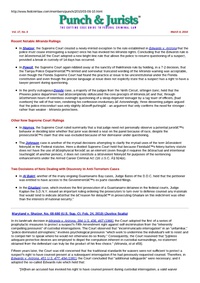It has been some 20 months since the Supreme Court issued its historic ruling in District of Columbia v. Heller, 128 S.Ct. 2783 (June 26, 2008), declaring that the Second Amendment provides an individual right to have a gun for private use. And since that decision, the lower courts …
Here a divided Court held that because Florida’s felony battery statute does not have the use of “physical force” as an element, it does not constitute a “violent felony” for purposes of the sentencing enhancements under the ACCA.
A recent search on Westlaw for Federal cases using the …
Here, a divided Court held that the district court was not "indisputably wrong" when it declined to order restitution on the grounds that the Government had failed to prove that the defendant's conduct proximately caused the victim any damages.
The case is particularly noted for Judge Dennis' dissent, …
Here a bitterly divided en banc Court rejected a facial challenge to a San Francisco blanket cavity strip-search policy for individuals about to be housed in the city jail whether or not they pose an individualized risk of smuggling.
[Editor's Note: For a commentary on this decision, see …
In this case, the defendant argued that the government violated a Pimentel-like non-binding plea agreement by advocating for a sentence higher than the estimate contained in the agreement. In the majority opinion, the court simply held that its precedents on this issue are in conflict, and that, given this, …
In another of its growing list of cases that are decided without full briefing or argument, the Supreme Court held, in this unsigned opinion, that a trial judge need not personally observe a potential juror’s behavior in deciding later whether that juror was denied a seat on the panel …
In this case, the Supreme Court ruled that Tampa police officers adequately warned a criminal suspect of his Miranda rights when they advised him that he had “the right to talk to a lawyer before answering [any] questions” and that he could invoke that right “at any time.” In …
In its landmark decision in Miranda v. Arizona, 384 U.S. 436, 467 (1966), the Court adopted the first of a series of prophylactic measures to protect a suspect's Fifth Amendment right against self-incrimination from the "inherently compelling pressures" of custodial interrogations. The Court observed that "incommunicado interrogation" in an …
Amin Al Bakri is another of the many detainees at Guantanamo Bay who have challenged their detention; and they all appear to face the same general roadblock: the Government fights disclosing almost every piece of evidence that the detainees seek on the grounds that the information is classified.
Judge …
This case, involving Ahmed Ghailani had already attracted a lot of attention. Ghailani, a Tanzanian and an alleged member if Al Qaeda, is one of the alleged terrorists accused of conspiring to blow up American Embassies in Kenya and Tanzania in 1998. He was tracked down and finally arrested …
Here, a majority of the en banc court held that the Phoenix police department had “completely obfuscated the core precepts of Miranda,” and had overborn the will of the teenage suspect "rendering his confession involuntary”.
For anyone who continues to question the absolute need for strong and unrestricted …
